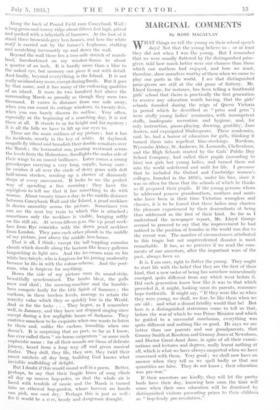MARGINAL. COMMENTS
By ROSE MACAULAY WHAT things we tell the young on their school speech days! Not that the young believe us : or at least they did not when I was the young. But I remember that we were usually flattered by the distinguished prize- giver, told how much better were our chances than those which our mothers had enjoyed, and how we must, therefore, show ourselves worthy of them when we came to play our parts in the world. I see that distinguished prize-givers are still at the old game of flattery. Mr. Lloyd George, for instance, has been telling a Southwold girls' school that theirs is practically the first generation to receive any education worth having, that the girls' schools founded .during the reign of Queen Victoria (a period which he described as " prim and grim ") were stuffy young ladies' seminaries, with incompetent staffs, inadequate recreation and hygiene, and, , for only instruction, piano-playing, drawing, gentility, Jane Austen, and expurgated Shakespeare. These academies, said, he, had a horror of education for girls, thinking it turned them into repellent blue-stockings. Roedean, Wycombe Abbey, St. Andrews, St. Leonards, Cheltenham, and the High Schools started by the Girls' Public Day School Company, had called their pupils (according to him) not girls but young ladies, and turned them out into the world unlettered and unfit for life. I presume that he included the Oxford and Cambridge women's colleges, founded in the, 1870's, under his ban, since it was so often for these that the schools of 'which he thinks so ill prepared their pupils. If the young persons whom he addressed possess grandmothers, mothers and aunts . who have been in their time Victorian wranglers and classics, it is to be feared that these ladies may chasten the pleasure experienced by their descendants at being thus addressed as the first of their kind. So far as I understood the newspaper report, Mr. Lloyd George seemed to proceed to say that the improvement he had noticed in the position of females in the world was due to the recent war. The number of circumstances attributed to this tragic but not unprecedented disaster is most remarkable. It has, as we perceive if we read the corn- ments of our ancestors, after the important wars of the past, always been so.
It is, I am sure, right to flatter the young. They ought to start life with the belief that they are the first of their kind, that a new order of being has somehow miraculously emerged, quite different from any which went before it. Did each generation know how like it was to that which preceded it, it might, looking upon its parents, renounce hope forthwith. It might say, " If they were like us when they were young, we shall, we fear, be like them when we are old ; and what a dismal fatality would that be! But here is a distinguished statesman come to tell us that, before the war of which he was Prime Minister and which he guided to a successful conclusion, everything was quite different and nothing like so good. He says we are better than our parents and our grandparents, that Granny Smith at Roedean and Granny Jones at Newnham, and Doctor Great-Aunt Jane, in spite of all their exami- nations and lectures and degrees, really learnt nothing at all, which is what we have always suspected when we have conversed with them. Very good ; we shall now have an answer when they tell us we spell badly or that our quantities are false. They do not know ; their education was pre-war."
If their ancestors are kindly, they will let the pretty.
buds have their day, knowing how soon the time will come when their own education will be dismissed by distinguished visitors presenting prizes to their children as •" hopelessly pre-revolution."














































 Previous page
Previous page